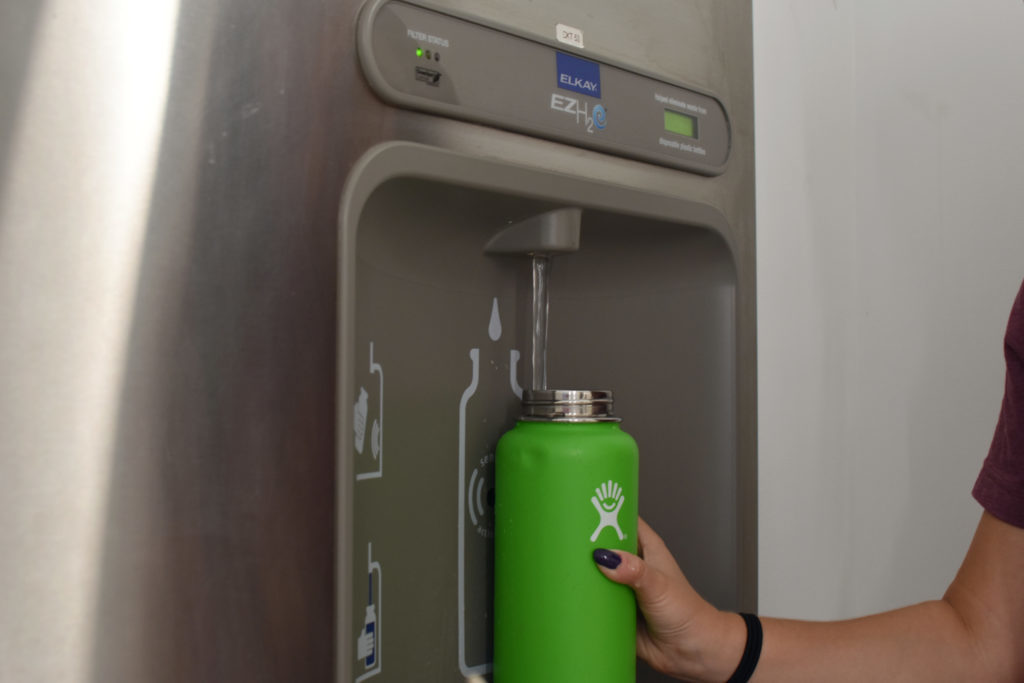Incoming students can track how many plastic bottles they save through an app after receiving reusable water bottles at this year’s orientation.
Senior Melody Asadpour announced at a New Student Orientation event Wednesday that incoming freshmen will be given reusable water bottles from Cupanion – a reusable water bottle company – and a scannable barcode tag that tracks how many single-use plastic water bottles students – and GW – are saving. Sustainability experts said the world-wide initiative, called “Fill it Forward,” will encourage participants to develop more sustainable habits throughout their college careers.
Asadpour said students can pick up the bottles on the first floor of the Marvin Center. Fill it Forward also donates to clean water projects like Dig Deep and Water First every time users refill their reusable bottle, according to the initiative’s website.
“Sustainability is a key initiative at GW, and this is a small way we can do our part,” she said.
Alumna Mia Simonetti brought the national “Take Back the Tap” initiative to GW last year to encourage students to drink tap water to preserve water resources and decrease plastic water bottle usage. Simonetti lobbied GW to add more water bottle refill stations for students.
Last September, the University declined to disclose whether GW met its goal to slash overall water consumption on campus by 25 percent by the end of fiscal year 2018, saying GW was developing a sustainability report. The University’s GWater Plan aims to decrease total water consumption and reduce GW’s impact on the Potomac and Anacostia rivers’ watersheds by 2021.
The plan also aims to reduce water bottle usage, improve water quality and increase rainwater retention. Officials installed filtered water stations in residence halls on the Mount Vernon Campus in April, and faculty and staff can submit requests to their building’s finance director to add a water bottle refill station through the Sustainable GW website.
Noah Swistak, the membership development manager at the Association for the Advancement of Sustainability in Higher Education, said the initiative will save energy needed to manufacture, fill and transport plastic water bottles.
He said that if “respected” higher education institutions take an active role in reducing single-use plastic bottle consumption, other universities and the general public may be encouraged to follow suit.
Swistack said that involving students in sustainability initiatives in their college careers will help them realize that relying less on single-use items, like straws and plastic bottles, is an easy habit to form. D.C. instituted a ban on plastic straws and stirrers in January 2019.
“It’s simple, it’s easy to articulate what you need to do and why it’s important,” he said. “So this sort of initiative is the perfect thing to get incoming freshmen set out on a path to engage with sustainability work on their campuses.”
Nathan Jandl, the assistant director of sustainability at the University of Wisconsin-Madison, said cutting down on plastic bottle use is an “easy” way to begin engaging incoming students in lifelong sustainability initiatives.
“It’s important for universities to generate and test out innovative ideas for engaging students in sustainability,” Jandl said in an email.
Blake Rupe, the sustainability program manager and sustainable water development program coordinator at the University of Iowa, said in an email that many students lack the resources to completely diminish their carbon footprint through measures like electric cars, but many universities still offer students opportunities to make environmentally conscious choices, like using reusable water bottles.
“It may not be feasible or possible for students to buy an electric car, but it is possible to choose reusable bottles, reusable bags and refuse straws,” Rupe said in an email. “Those little choices we make every day add up, have much bigger impacts than we think.”
She added that small steps, like forgoing single-use plastic water bottles, can help students feel like they’re contributing to a sustainability campus culture.
“We know that sometimes it can be incredibly hard to practice eco-positivity in our everyday lives, so hopefully something as simple as seeing the impact of reusable bottles on campus can help students feel like they are a part of the solution and want to continue to engage with sustainability in their college careers and beyond,” Rupe said.
Lizzie Mintz and Ed Prestera contributed reporting.





